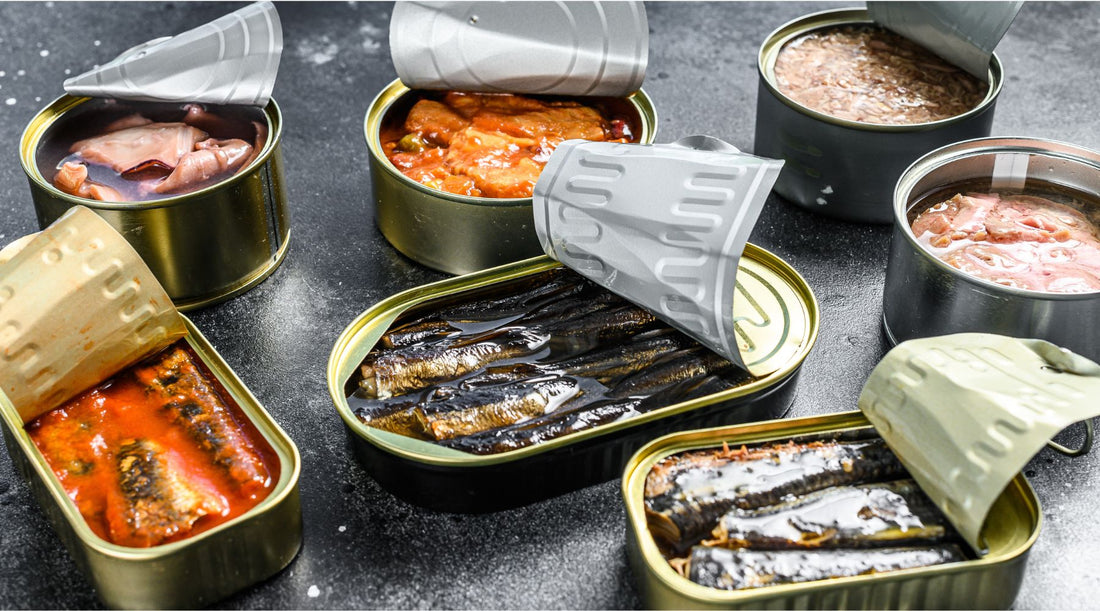What we eat matters. It's not just about satisfying hunger or filling our stomachs. The food we consume provides the building blocks for our bodies, giving us the energy and nutrients we need to function well. Unfortunately, many processed foods in the market are added with a wide range of additives to enhance the products' flavor, texture, and appearance, ensuring that your taste buds will love them. Hence, you eat MORE than you should.
But…...are all of the ingredients good for your health in the long run? I doubt it. Check out the list below as I highlighted the ten common food additives in your food. Find out what it is and why to avoid it whenever possible.

Artificial colors
Many synthetic food colorings, such as Red #40, Yellow #5, and Blue 1, are generally derived from petroleum. Studies show that artificial food colors have been linked to hyperactivity in children, disrupting the immune system and other potential health risks. They are often found in processed foods, such as candy, drink mixes, chewing gum, cereal, and snacks. Look for products that use natural colorings instead, such as beet juice or turmeric.
Artificial sweeteners
They are zero-calorie sweeteners like aspartame, saccharin, acesulfame potassium (Ace K), and sucralose. Commonly used in diet drinks, meal replacement shakes, protein powder, and protein bars. Artificial sweeteners have been shown to contribute to weight gain by increasing one's appetite and sugar cravings. Here's why: when you eat something sweet (but it has no calories), your brain is tricked into wanting more calories for energy to be satisfied. So you crave more foods and sweets than usual, eventually leading to weight gain.
BHA and BHT
Synthetic preservatives that are often used in packaged foods, such as chips, snacks, instant noodles, and canned goods, to extend their shelf life. Studies have shown these preservatives to be endocrine disruptors linked to cancer in animal studies. The EWG (Environmental Working Group) includes BHT and BHA on their Dirty Dozen List of Food Additives to avoid.
Erythritol
This is a type of sugar alcohol, often used as a low-calorie sweetener in diet foods and beverages. It can mess up healthy gut bacteria and lead to digestive issues, such as bloating and diarrhea, especially when consumed in large amounts. Research by Cornell University shows that the body metabolizes erythritol and associates high levels of erythritol in the blood with weight gain. While some fruits may contain natural erythritol, food manufacturers don't extract erythritol from natural food sources. Instead, they usually start with genetically modified (GMO) corn (unless organic or non-GMO verified) and undergo a complex fermentation process to get chemically pure erythritol.
High-Fructose Corn Syrup
It is a heavily processed sweetener from cornstarch (commonly from GMO corn) that contains more fructose than regular corn syrup. It has been linked to increased appetite, obesity rate, type 2 diabetes, heart disease, and dementia. Often found in many processed foods and beverages, including soft drinks, candy, ketchup, buns, and cookies.

Monoglycerides and Diglycerides
These two additives are commonly used as emulsifiers in processed food to improve texture and prevent the separation of ingredients (hold water-soluble and oil-soluble ingredients together). Typically made from oil byproducts, including partially hydrogenated oil, which contains trans fat, making these additives a hidden source of trans fat in our food. Moreover, the manufacturing process of these additives may involve using harmful chemicals, such as hexane, which can cause contamination and harm human health and the environment. Widely found in baked goods, ice cream, margarine, and spray-dried oil powder or creamer.
Monosodium Glutamate (MSG)
It is a flavor enhancer that is often used in savory foods, such as canned soups, frozen meals, chips, instant noodles, and snacks. Mainly used to make food taste much better and increase food cravings, so you eat more than you should. Overeating MSG can cause an overshoot in sodium intake, which is bad for health in the long term. Some people reported experiencing headaches, nausea, chest pain, etc., after eating food containing MSG. Want to enhance the flavor of your food? Use natural flavorings instead, such as herbs and spices.
Partially Hydrogenated Oil
This type of oil undergoes a chemical process that turns liquid oil to solid. Partially hydrogenated oil contains trans fats, which are known to contribute to heart disease, inflammation, and other health issues. The CDC noted that trans fat increases the risk of coronary heart disease (CHD) morbidity and mortality, and the Institute of Medicine (IOM) says trans fats have "no known health benefit" and there is no safe level to eat. Always check food labels and avoid products that contain them.
Potassium Bromate
This ingredient is often used in bread-making to improve the texture and rise of the dough. However, potassium bromate is known as a "carcinogen." In other words, this substance can cause cancer (at least in laboratory mice). It is banned in the EU, the UK, Canada, Brazil, India, Japan, and China.
Sodium Benzoate
A synthetic preservative commonly used to prevent the growth of bacteria and extend the product's shelf life. Sodium benzoate, when combined with vitamin C, forms benzene. According to the FDA, this substance is a carcinogen known to cause cancer. Sodium benzoate and vitamin C can often be found together in fruit juices, sports drinks, or sodas. Are you craving fruit juice? Simply make yourself one or look for organic certified fruit juices on the shelves.
READ THE LABEL & KNOW WHAT YOU EAT
Reference:
Artificial color
https://www.ncbi.nlm.nih.gov/pmc/articles/PMC2957945/
https://pubmed.ncbi.nlm.nih.gov/23026007/
Artificial sweetener
https://www.cmaj.ca/content/189/28/E929
https://pubmed.ncbi.nlm.nih.gov/29570245/
https://www.cspinet.org/page/chemical-cuisine-ratings#acesulfamek
https://www.health.harvard.edu/blog/is-there-a-link-between-diet-soda-and-heart-disease-201202214296
BHT and BHA
https://www.ewg.org/foodscores/ingredients/20804-BHT/
https://pubmed.ncbi.nlm.nih.gov/21536018/
https://www.ewg.org/foodscores/ingredients/7519-ButylatedHydroxyanisoleBHA/
https://www.scientificamerican.com/article/bha-and-bht-a-case-for-fresh/
https://www.ibtimes.co.uk/additive-breakfast-cereals-could-make-brain-forget-stop-eating-1634413
Erythritol
https://pubmed.ncbi.nlm.nih.gov/16988647/
https://draxe.com/nutrition/erythritol/
High Fructose Corn Syrup
https://www.sciencedirect.com/science/article/pii/S0002916522038837?via%3Dihub
https://pubmed.ncbi.nlm.nih.gov/23181629/
Mono- and di-glycerides
https://draxe.com/health/dangerous-additive/
https://www.youtube.com/watch?v=xTskxePGePM
https://foodadditives.net/emulsifiers/mono-and-diglycerides/
https://patentimages.storage.googleapis.com/3a/09/74/c2c1d60813864c/US20020120159A1.pdf
https://patents.google.com/patent/US20020120159A1/en
MSG
https://www.ncbi.nlm.nih.gov/pmc/articles/PMC5938543/
https://thejournalofheadacheandpain.biomedcentral.com/articles/10.1186/1129-2377-14-2
Partially Hydrogenated Oil
https://www.cfs.gov.hk/english/multimedia/multimedia_pub/multimedia_pub_fsf_169_02.html
https://www.cspinet.org/article/trans-fat-partially-hydrogenated-vegetable-oil
https://www.cdc.gov/pcd/issues/2019/pdf/19_0121.pdf
https://www.ncbi.nlm.nih.gov/pmc/articles/PMC3551118/
Potassium Bromate
https://nj.gov/health/eoh/rtkweb/documents/fs/1559.pdf
https://www.ncbi.nlm.nih.gov/pmc/articles/PMC1567851/
https://www.sciencedirect.com/science/article/pii/S2405844023003535
Sodium Benzoate
https://www.livestrong.com/article/524480-how-is-sodium-benzoate-used-in-food/
https://www.mdpi.com/2306-5710/4/2/33

